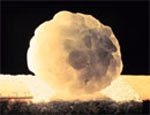 |
| Image: physicalgeography |
An American scientist has discovered the mechanism behind the Mpemba effect, which was noted after a Tanzanian student named Erasto Mpemba observed that the sugar-sweetened milk he used to make ice cream froze faster when it was initially hot.
According to him, the so-called “Mpemba effect” is simply a common phenomenon that occurs with all solutes.
Jonathan Katz from the University of Washington, who has studied the Mpemba effect in detail, indicates that the solutes in question are calcium and magnesium bicarbonate—two components that make most drinking water “hard.” When water is heated, these components precipitate, forming solid residues in the kettle.
Katz explains that if the water has never been heated, it still contains these solutes. When it freezes, ice crystals form, causing the concentration of solutes in the remaining water to become significantly higher—up to 50 times more than usual—thus lowering the freezing point of the water. In other words, water will freeze at a lower temperature.
According to Katz, there is also a second effect that hinders the freezing of water that has never been heated. The lowered freezing point reduces the temperature difference between the liquid and the portions that have already frozen around it. “Since the rate of heat loss from water depends on this temperature difference, unheated water will lose heat much more slowly, and therefore freeze more slowly.”
Katz suggests that the combination of these two effects may fully explain the phenomenon of heated water freezing faster than water that has never been heated. He is waiting for someone willing to conduct experiments to verify his hypothesis.
T. An


















































